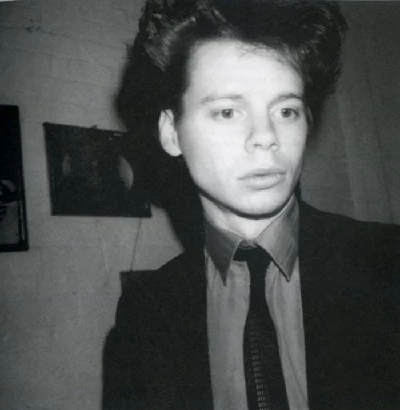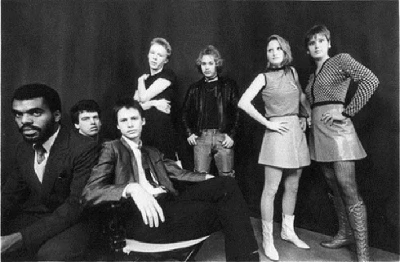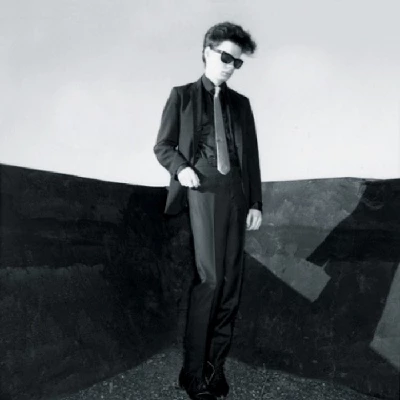Miscellaneous
-
No Wave Part 2
published: 26 /
6 /
2011

In the second part of his four part No Wave series, Jon Rogers reflects upon the influence of the saxophone-playing James Chance and his band the Contortions
Article
According to James Chance, he was kicked out of Teenage Jesus and the Jerks by Lydia Lunch who wanted to alter the sound of the group. "She decided that she didn't want me in the band anymore," remembered Chance in 'Babylon's Burning'. "She wanted the sound to be more minimal. I don't know if it was strictly a musical thing, or if she was threatened because I was getting some of the attention." Lunch seems not to have liked Chance's involvement with the audience. On stage she would remain rigid, refusing to engage the audience in any way. In effect she put a barrier up between audience and artist whereas Chance wanted the audience to be active participants in the show: "I didn't think TJ [Chance] should mingle with the audience," Lunch told Reynolds. "Even if to attack them. Don't touch those bastards, let 'em just sit there in horror."
Chance simply went off and formed his own group, what would become the acclaimed Contortions. Chance's original idea was to have a female singer and tried out a couple of people for the role, including the girlfriend of Suicide's Alan Vega who had a homemade synthesizer. But neither worked out and so Chance just decided to sing himself although he did team up with a woman for the band, keyboardist Adele Bertei who pounded away on her Acetone instrument. German-born Bertei hailed from Cleveland and had co-founded Peter and the Wolves with Peter Laughner, the former Rocket from the Tombs singer and guitarist. Also joining the line-up was his school friend Mark Johnson, who was Cassandra Wilson's drummer, and Bern Nix who was recruited from Ornette Coleman's Prime Time where he played guitar.
The style of the band, according to Chance, wouldn't be such a high concept as Teenage Jesus but more danceable and would hopefully reach a wider audience than just arty, sophisticated types who had been attracted to Teenage Jesus. Drawing on the spiky free jazz of Albert Ayler and Sun Ra, the funk of James Brown and the stage antics of the Stooges, the Contortions were punk-funk-jazz noiseniks.
While Lunch had no musical training Chance had been learning the piano from the age of seven and spent three years at the Wisconsin Conservatory of Music. His keyboard style, picked up from the likes of Thelonius Monk and Cecil Taylor, didn't go down well though with his conservative instructors who preferred a more traditional approach. After a year at the school, taking his cue from the likes of Albert Ayler and Maceo Parker as well as the more bop orientated Lester Young and Charlie Parker, he picked up the saxophone. Before moving to New York he'd played in a Velvets-Stooges influenced band called Death.
After moving to Manhattan in 1976 to be part of the jazz scene there he played in a group called Flaming Youth but he was too confrontational and his playing too chaotic and didn't last long.
"I wanted it [Contortions] to be completely uncompromising," Chance told 'Babylon's Burning'. "But I didn't want to make it so 'out there' that it had no chance at all."
While Chance had gained a musical training he preferred people to be in his band who couldn't play. "People who can't play have more fresh ideas," he once reflected. "I looked for people I could teach to play."
Bertei - who Chance once described as being "like some kind of lesbian pimp" - had her own unique style of playing keyboards. Instead of always using her fingers to hit the keys she'd invariably hammer the keys with her elbows and fists. She approached the keyboards in a similar way she played a conga drum: "real percussive, slapping the keys in clusters," as she told 'East Village Eye'. "I'd beat them up with my fists or elbows... Once I jumped up on the keyboards at a particularly frenzied gig and I kinda danced on them, which fucked the keyboard up."
Guitarist Pat Place, who hailed from Chicago and had moved to New York in 1975, was similarly untutored to do even the most basic of guitar playing. Place recollected the "cacophony" of the first Contortions' gig to Reynolds: "At the end I had two strings left on my guitar and it was completely blood-splattered. I didn't know how to strum the guitar and it just ripped the skin right off my fingers."
The Contortions’ first gig was at Max's on 4 December 1977 although in the early days of the band the line-up was extremely fluid with only Chance and Bertei being regulars. The drummer from Chance's jazz outfit, Steve Moses, only played one gig with the Contortions before settling on the more permanent Don Christensen. They also had a Japanese drummer for a while and a British lead guitarist.
The Contortions played their free jazz-funk-punk fast. "Live, James would insist on counting everything, and he'd always double the time," reflected Christensen to 'Melody Maker' in 1980. With Jody Harris, the band's second guitarist, adding: "One time he counted it out so fast we couldn't play it. He couldn't just relax and let the music get into any kind of groove - he had to have absolute control over the sound."
While the punks sneered at disco, Chance, while perhaps in part, trying to be provocative and distance himself from punk, also saw something in it. He told the 'Soho Weekly News' in January 1979: "I've always been interested in disco. I mean, disco is disgusting, but there's something in it that's always interested me - monotony."
Certainly Chance liked to stir things up and with some of his statements it is hard to know whether he really meant them or was just trying to provoke and be confrontational. In a piece for the 'East Village Eye' that he wrote with Anya Philips, his lover and band's manager, he extolled the advantages of selling out:
"Anyone with any semblance of a brain should know by now that it's time to forget about all this outdated, cornball 'new/no wave' drivel. Anyone who stays on the Lower East Side will become the inevitable victim of provincial mind rot... So dislocate yourself. Get slick, move uptown and get trancin' with some super-radioactive disco voodoo funk."
In the same article Philips painted herself as the Svengali manager; responsible for grooming and styling Chance and setting him on the road to fame and fortune: "Money bought us a first-class ticket out of the Lower East Side pisshole. It's not my problem you're all waiting to leave on standby."
The Chinese-American Philips though was distrusted by the other band members, especially by Bertei: "She began to cause a rift between James and the band, make him the star," she told Reynolds. "Not that he wasn't already the leader, but it became the James Chance Show after she became manager. She ended up leaving the band in autumn 1978. It is perhaps telling that the group's first album, 'Buy' was credited to the Contortions, while its sister album 'Off White' was named as being by James White and the Blacks where the existing members of the Contortions were hired as session musicians. Supposedly, Philips even wanted to credit it as James White and His Blacks, but the group wasn't having that.
'Buy' and 'Off White' (both released by Ze in 1979) can really be seen as sister albums with the former being the more abrasive and exploring the darker aspects of sexual desire, nihilism and self-degradation. Even the cover of 'Buy', featuring author Terry Sellers in a Philips-designed bikini or underwear that looked like it was about to fall apart and Sellers struck a pose as if she was doing a modelling session for some mail-order clothing catalogue. The advertising imagery was also reflected with the name of the band and the title designed so it read 'Buy Contortions'.
'I Don't Want to Be Happy' saw Chance confess that his "idea of fun" was "being whipped on the back of the thighs." In 'Bedroom Athlete' he states: "I won't be your slave unless you will be mine." While in the band's most famous song, 'Contort Yourself', Chance pleads:
"It's better than pleasure
It hurts more than pain
I've got what it takes to drive you insane
Now is the time to
Lose all control
Distort your body
Twist your soul."
It's significant that the song, in different versions, would appear on both albums. Chance's worldview wasn't a pretty one - full of cynicism, self-hatred and misanthropy. The only thing to do, according to the song, was to "Reduce yourself to zero" and to "Take out all the garbage that's in your brain". In an interview with the 'New York Rocker' Chance proclaimed: "I do not relate to people. I have no respect for a fan. A fan is the lowest creature on earth."
'Off White' - dubbed "mutant disco" and released in mid-1979 in Europe - also picked up on the theme of S&M-tinged sexual encounters with 'Stained Sheets' with Chance engaging with Lunch (who makes a cameo appearance as the character Stella) engaging in a spot of phone sex. Chance plays a sneering, blasé man, feigning disinterestedness while Lunch just moans and groans in orgasmic delight. Lunch would also help out on the track 'Bleached Black', adding some scrapped violin across the song.
'Off White' also explored the notion of race, and in particular racial tourism that Lou Reed explored in 'I Wanna Be Black'. There were parts one and two of 'Almost Black' (featuring Philips and Bertei, who had made an appearance despite previously leaving the band) on the album, along with 'White Savages', 'Off Black', 'Bleached Black' and 'White Devil'. Something of an anomaly on the album is a cover of Irving Berlin's 'Tropical Heatwave', while Kristian Hoffman and Philips (credited as 'Ginger Lee' on the album) pulled out their best lounge lizard-style crooning.
While the Contortions' songs like 'Roving Eye' may appear to be completely anarchic there was always a structure: "My songs were always in a key, they had some kind of tonal centre," said Chance in 'Rip It Up and Start Again'. "But I didn't have chord structures; I constructed the songs out of interlocking parts played by each instrument, an idea I more or less got from James Brown."
While perhaps the Contortions weren't musically as confrontational as Lunch and Teenage Jesus, their gigs certainly were. Chance was particularly physical at concerts. At a benefit for 'X' magazine Chance, angered by some people simply sitting on the floor, waded into the audience and started pulling them up onto their feet, if that wasn't enough, he'd throw a few punches too. It was at this gig that Chance would bump into Phillips. At times too, Chance seemed to display a masochistic streak. "He'd jump into the crowd and start kissing some girl. The boyfriend would push him off and a fist-fight would ensue," Bertei related in 'Rip It Up and Start Again'. "Our bassist George Scott and me would leap offstage and get into the mêlée. Then we'd all get back on to the stage with blood running down our faces - James being the worse for wear always because he'd get the brunt of it; plus he's so tiny." In Bertei's mind she thought the music was becoming sidelined in favour of Chance's confrontational antics and the band really should be called James Chance and the Distractions.
"They were just really scary," says Sonic Youth guitarist Thurston Moore, who saw the band several times. "I wasn't really interested in the funk element or the jazz element. But Chance really was twisted - he was like a little cockroach, he was super-jittery. He'd play his saxophone and scream and then just do this hyper James Brown move and twirl around and jump on somebody and push 'em really hard. Or hit somebody or kick somebody."
It's hard to know just how much of that violent aspect was down to conscious sensationalism as a way of gaining a notorious reputation - and media attention - or a genuine avant-garde attitude of seeing the people who had bothered to come to see you play as participants in a spectacle rather than merely an audience of spectators wanting to be entertained.
Chance would confront just about anyone, jumping on Legs McNeil, who was a writer for 'Punk' magazine and the famed New York critic Robert Christgau at a festival of no wave acts held over five nights at the Artists Space in the Fine Arts Building on Franklin Street, located in the area south of SoHo known as Tribeca on 2-6 May 1978. The 'New York Rocker' painted what happened rather vividly:
"Mr Chance immediately established his personal space at the top of his performance by kicking out all those artist-types sitting cross-legged within about a six-foot radius of his band, as he snarled and smirked with unmerciful obnoxiousness [...] Robert Christgau found himself on the floor in a fierce imbroglio with James Chance. The aroused rock crit admirably acquitted himself by pummelling the lead Contortion into bloody submission [...] The music featured was aggressively ugly, often gratingly so. It is difficult to imagine an American audience being attracted to this kind of melodic chaos. It is a sound akin to the mutilated narrative in literature."
According to Christgau's own account of the incident in 'Rip It Up and Start Again' it wasn't quite so violent. During the Contortions' set on the Friday night Chance left the stage and "playfully or pseudo-playfully" started to hit a female friend of his. The woman's husband then waded in but was pulled off only for Christgau to get involved: "I intervened and basically sat on Chance. Maybe I held him down, too. He's a little guy."
Picture Gallery:-

